Scientists have sent more than 100 baby squids into space — to understand how long-term exposure to low-gravity environments affects living organisms.
NASA, which is in charge of the project, sent the animals to the International Space Station, a floating and habitable artificial satellite orbiting the Earth that serves as a space environment research laboratory.
The goal behind the endeavor is to understand how the human body’s healthy, symbiotic relationship with microbes — such as good bacteria — changes in low-gravity conditions in space. “Animals, including humans, rely on our microbes to maintain a healthy digestive and immune system. We do not fully understand how spaceflight alters these beneficial interactions,” Jamie Foster, the experiment’s principal investigator, told BBC News
Scientists explained that squids have an immune system similar to that of human beings — making them the preferred choice for the experiment. Just like good bacteria helps human beings digest food and absorb nutrients, it helps squids regulate their bioluminescence, their ability to emit light.
Related on The Swaddle:
Space Station Astronauts Discover Never‑Before‑Seen Microbes
By studying how space-flight affects the squid, the researchers hope to formulate ways of preserving human health during space missions. “As astronauts spend more and more time in space, their immune systems become what’s called ‘dysregulated.’ It doesn’t function as well. Their immune systems don’t recognize bacteria as easily. They sometimes get sick,” Foster told USA Today.
Researchers are hopeful the study would not only benefit future space missions, but also improve life on the Earth. “The work also could lead to a better understanding of the complex interactions between animals and beneficial microbes, including new and novel pathways that microbes use to communicate with animal tissues,” a statement by NASA reads.
“Such knowledge could help identify ways to protect and enhance these relationships for better human health and well-being on Earth as well.”
The squids are expected to be back to Earth next month.




